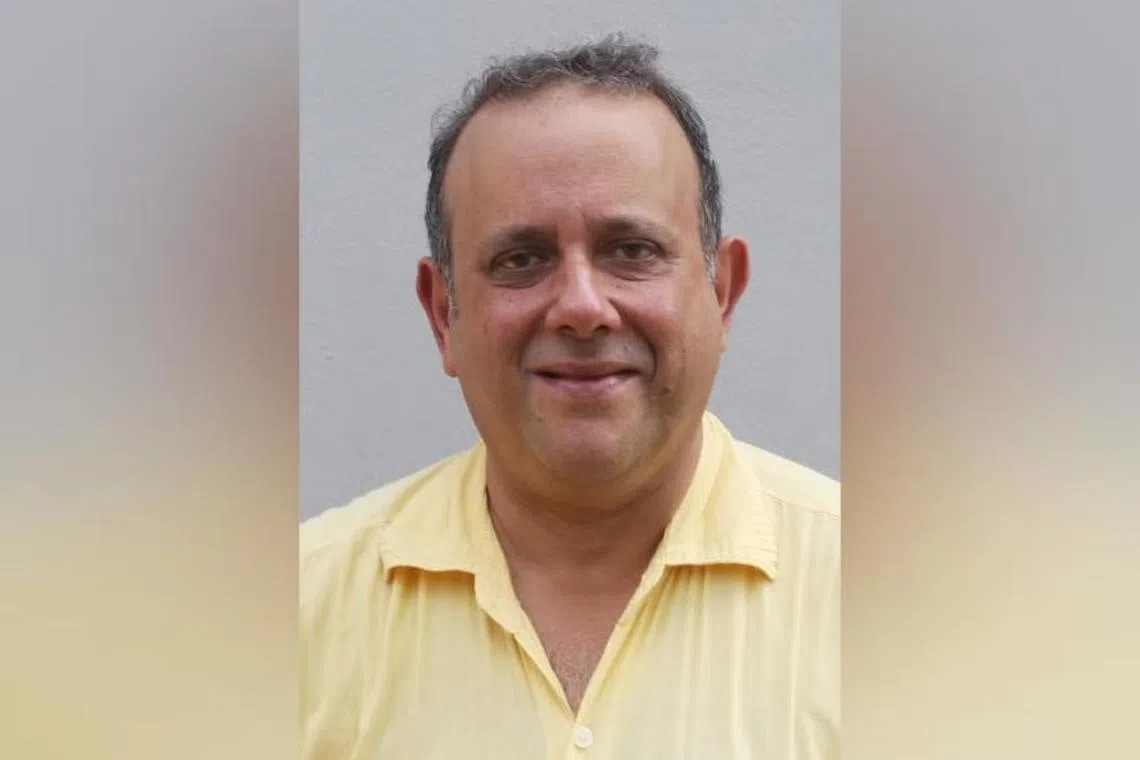Kenneth Jeyaretnam issued seventh Pofma correction order
Sign up now: Get ST's newsletters delivered to your inbox

The correction direction requires Mr Kenneth Jeyaretnam to insert a notice against an original Facebook post he put up on May 25, with a link to the Government’s clarification.
PHOTO: LIANHE ZAOBAO FILE
SINGAPORE – Reform Party chief Kenneth Jeyaretnam has been asked to put up a correction notice under the law against fake news, over his statements claiming that the prime minister and minister for law can influence performance bonuses paid to specific High Court judges.
He was issued a correction direction under the Protection from Online Falsehoods and Manipulation Act (Pofma) on May 29 on the instruction of Minister for Culture, Community and Youth and Second Minister for Law Edwin Tong.
On May 25, Mr Jeyaretnam had put up a Facebook post commenting on the defamation suits brought against Mr Lee Hsien Yang by Minister for Home Affairs and Law K. Shanmugam and Minister for Foreign Affairs Vivian Balakrishnan.
Mr Lee, the younger brother of Senior Minister Lee Hsien Loong and son of founding prime minister Lee Kuan Yew, had been found guilty by a High Court judge of defaming the ministers over their rental of state bungalows in Ridout Road and was ordered to pay the ministers $200,000 each.
The ministers had sued for defamation proven untrue by the Corrupt Practices Investigation Bureau and an independent review
In his May 25 post, Mr Jeyaretnam implied that there could have been a conflict of interest as the two ministers had been allowed to sue Mr Lee Hsien Yang for defamation, without first stepping down from their posts.
The opposition politician specifically singled out Mr Shanmugam, saying that as law minister, he “may have some input, along with the PM, into the appointment and promotion of High Court judges and into the size of their performance bonuses”.
Debunking this, the Ministry of Law said in a statement on May 29 that Mr Jeyaretnam’s claim was untrue, adding that he had been issued a Pofma correction direction over it.
The Singapore Constitution, under Article 98(6), empowers the legislature to make law to provide for the remuneration of Supreme Court judges, the ministry said.
The relevant law, the Judges’ Remuneration Act 1994, sets out the framework for the salaries, allowances and privileges accorded to Supreme Court judges and the annual pensionable salary of Supreme Court judges is also fixed by law, the ministry said.
The ministry added that it is the Chief Justice who then decides on the salary and bonuses to be paid to each Supreme Court judge, within the scope of the framework.
In addition, the Constitution also provides that a Supreme Court judge’s remuneration and other terms of office shall not be altered to his or her disadvantage after his or her appointment, noted the ministry.
“Neither the prime minister nor any minister can determine or influence the payments to be made to specific judges under this framework,” the ministry said in its statement.
“Mr Jeyaretnam’s allegation is thus false.”
The correction direction requires Mr Jeyaretnam to insert a notice against the original post, with a link to the Government’s clarification.
In issuing the Pofma correction order, the Government also made additional clarifications on other statements in Mr Jeyaretnam’s post, which it said were “misleading and give an inaccurate picture”.
In an article published on its Factually website, the Government said Mr Jeyaretnam had omitted critical facts about the judicial appointment process, adding that in so doing, he “seeks to undermine public confidence in the judicial system and the many men and women of Singapore’s judiciary and the Singapore Judicial Service”.
The process for the appointment of Supreme Court judges, including their appointment to a higher court, is governed by the Constitution, the Factually article said.
It is the president, acting in his discretion, who appoints the judges, if he concurs with the advice of the prime minister, the article added.
Under the Constitution, the prime minister is also required to consult the Chief Justice before tendering his advice on the appointment of judges to the president.
A wide variety of people may be consulted in this process, and often are, the article said. They include lawyers in private practice, lawyers in government, as well as others who may have knowledge of the persons being considered for appointments.
Once appointed, these judges are also guaranteed security of tenure and remuneration under the Constitution, the article noted.
They can be removed only on grounds prescribed in Article 98(3) of the Constitution, and only on the recommendation of a tribunal of at least five people who hold or have held office as Supreme Court judges, or who hold or have held equivalent office in any part of the Commonwealth.
Besides Supreme Court judges, the Constitution also sets out the process for the appointment and promotion of officers of the Singapore Judicial Service, the article said, adding that this was within the “exclusive control of the Judicial Service Commission, which is headed by the Chief Justice”.
Another additional clarification the Government made had to do with the defamation law, which it said applies equally to everyone.
“Mr Jeyaretnam says that defamation laws only serve to protect those in power. This is inaccurate,” the article said.
Noting that people should be entitled to protect themselves against false allegations that affect their reputations, the article said Mr Chiam See Tong, founder of the Singapore People’s Party, and “one of Singapore’s most respected opposition politicians” had taken action against others, including two former government ministers, for defaming him.
The ministers apologised and reached an out-of-court settlement with him, the article said, without mentioning the ministers specifically.
In the 1980s, Mr Chiam had taken action against then Foreign and Culture Minister S. Dhanabalan and then Defence Minister Howe Yoon Chong over remarks they made about his competence as a lawyer. He eventually settled with both of them after they withdrew their statements and apologised.
The article also added that Mr Chiam had rigorously scrutinised the Government and those in power throughout his career and had never been sued for defamation.
The article said: “Mr Jeyaretnam has repeatedly published false and misleading statements. This is the seventh correction direction issued to him.
“His latest post continues to propagate false and unfounded statements, reflecting a deliberate intent to undermine our public institutions.”



